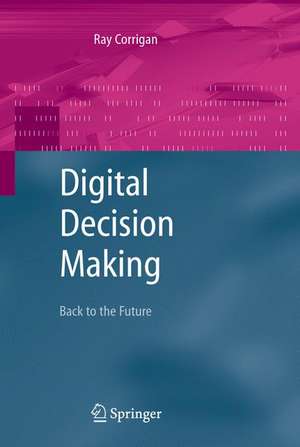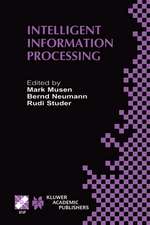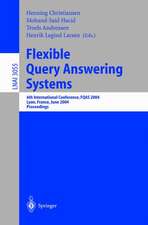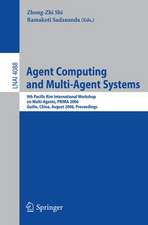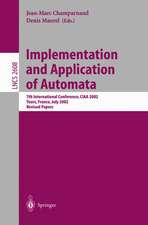Digital Decision Making: Back to the Future
Autor Ray Corriganen Limba Engleză Paperback – 11 iun 2007
The far-reaching implications for commerce and society of some of these decisions in invisible or opaque specialist fields, however, mean they should be matters of concern for every citizen. This book argues: Decisions should be based on an understanding of the systems, technology and environment within which they operate. Experts and ordinary people should work together. Technology and law are evolving in restrictive rather than enabling ways.
It aims, to stimulate an awareness of the issues and be a readable, challenging and informative introduction, both for university students and the general reader, to processes surrounding developments in technology and law.
Preț: 333.88 lei
Preț vechi: 417.34 lei
-20% Nou
Puncte Express: 501
Preț estimativ în valută:
63.91€ • 69.44$ • 53.72£
63.91€ • 69.44$ • 53.72£
Carte tipărită la comandă
Livrare economică 21 aprilie-05 mai
Preluare comenzi: 021 569.72.76
Specificații
ISBN-13: 9781846286728
ISBN-10: 1846286727
Pagini: 328
Ilustrații: XIV, 312 p.
Dimensiuni: 155 x 235 x 17 mm
Greutate: 0.46 kg
Ediția:2007
Editura: SPRINGER LONDON
Colecția Springer
Locul publicării:London, United Kingdom
ISBN-10: 1846286727
Pagini: 328
Ilustrații: XIV, 312 p.
Dimensiuni: 155 x 235 x 17 mm
Greutate: 0.46 kg
Ediția:2007
Editura: SPRINGER LONDON
Colecția Springer
Locul publicării:London, United Kingdom
Public țintă
Professional/practitionerCuprins
The battle of the book.- to decision making.- Harry Potter and the full-blooded lawyers.- Infodiversity and the sustainability of our digital ecology.- Canaries in the mine.- Facts, values and agendas.- Technology is just a tool.- DDM in intellectual property.- Experts and ordinary people.- A modest proposal.
Recenzii
From the reviews:
"The objective of the book is to induce a consciousness of these issues by adopting a mildly narrative approach. It is intended for university students, as well as for the lay public. … Corrigan provides notes for every chapter, a list of current references, and a handy index. … I recommend this book to students of information and communication technologies, technologists, administrators, and the general public; they will gain useful insight from it." (S. V. Nagaraj, ACM Computing Reviews, Vol. 49 (8), August, 2008)
"The objective of the book is to induce a consciousness of these issues by adopting a mildly narrative approach. It is intended for university students, as well as for the lay public. … Corrigan provides notes for every chapter, a list of current references, and a handy index. … I recommend this book to students of information and communication technologies, technologists, administrators, and the general public; they will gain useful insight from it." (S. V. Nagaraj, ACM Computing Reviews, Vol. 49 (8), August, 2008)
Textul de pe ultima copertă
Since the general public began to use the Internet in the mid 1990s, there has been a vast amount of investment by governments and commerce in digital communications technologies. There has also been a fair degree of confusion and sometimes controversy about the purpose and effectiveness of such technologies, for example the proposed UK identity card system. Decisions about digital communications technologies are not always so clearly a subject of political concern as is the case with identity cards.
The far-reaching implications for commerce and society of some of these decisions in invisible or opaque specialist fields, however, mean they should be matters of concern for every citizen. This book argues:
•Decisions should be based on an understanding of the systems, technology and environment within which they operate.
•Experts and ordinary people should work together
•Technology and law are evolving in restrictive rather than enabling ways
It aims, through a gentle narrative approach, to stimulate an awareness of the issues and be a readable, challenging and informative introduction, both for university students and the general reader, to processes surrounding developments in technology and law which have important implications for the knowledge society.
Ray Corrigan is a Senior Lecturer in Technology with the Open University.
The far-reaching implications for commerce and society of some of these decisions in invisible or opaque specialist fields, however, mean they should be matters of concern for every citizen. This book argues:
•Decisions should be based on an understanding of the systems, technology and environment within which they operate.
•Experts and ordinary people should work together
•Technology and law are evolving in restrictive rather than enabling ways
It aims, through a gentle narrative approach, to stimulate an awareness of the issues and be a readable, challenging and informative introduction, both for university students and the general reader, to processes surrounding developments in technology and law which have important implications for the knowledge society.
Ray Corrigan is a Senior Lecturer in Technology with the Open University.
Caracteristici
Readable introductory guide to decision making processes in technology and law, which have important implications for the knowledge society Includes supplementary material: sn.pub/extras
